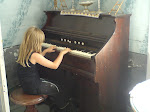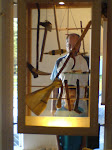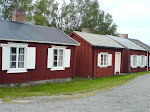Does this come from nowhere? Or from where does such a frustration and fury and anger come? What has this 12-year old child experienced? Which makes him (I think it was a he) unable to control his feelings and frustrations? And how will his future life turn out? Will he "adapt" to society? And what is "adaption" about?? Do we want to know what's behind, acknowledge what's possibly behind? Or are we afraid of confronting ourselves with this truth??? The most comfortable for us (the grown up world) is to - what??
And what is it we see in many blogs? From many commentators! People with such a hate. From where? Early things triggered by the here and now? Politicians and politics which makes their hate "legitimate" in a way, though violence is never legitimate. This need also shown in humiliation-TV?? Programs people enjoys watching?? And why are they so popular (but are they as popular as one maybe can get the impression they are? Is it so bad as we believe? Maybe?)?
Politics which give harmed people "permission" to act things out!? Gives them "approval" to hate. Are politicians (or other people with power of al different kinds) aware of this? Do they care? Should they care maybe, care about what they forward through their policy and what they say and how they behave? How they put their words etc. Is this maybe a responsibility they ought to take?
Do all harmed behave like this though? Does some turn their feelings of hate and rage and fury in other directions (maybe they don't even are in contact with them)? Do they turn them towards themselves? And how?
And what many commentators devote themselves to, is that to "kick other people in their heads as hard as they possibly can", though not literally, a wish to let others feel what they feel, feel all their pain, fear, frustration, which they maybe aren't really aware of either? Which they maybe also denies? Denies to themselves. Others are to pay for what these individuals have endured and experienced. And in this way they push their problems away from themselves, effectively too! This is their way of solving their problems! In this way they don't really have to deal with their own! They will never solve their own maybe (or most probably, if they don't encounter a real and deep crisis, then maybe, but maybe not even then)?
Their anger is a defence against the truth, their truth!? And people using this sort of defence are less prone to do something about their own problems?? They are more prone of blaming others and everything else, than doing a work on themselves? They use this defence to avoid feeling the power and helplessness they once experienced?? Gives them a sense of power, a false sense of power? A power they actually don't need today and which very often harm other people. A grown up person need other forms of power. And usually has a power the child didn't have once. But the grown up need to maintain his/her strength an power, to demonstrate it really??
And this sort of people are allowed to ravage!!! As it has been through our lives!!? From early in school: boys taking a lot of space and place, and being allowed to (because boys are that way). The silent girls (AND silent boys) have had to pay the prize, take the responsibility, maybe not being really listened to or seen (and what does this create in them? In turn). Ans maybe they also had a story to tell?? Experiences which hey had to carry alone and on their own??? Manage and cope with things on their own... Solving things on their own.
But girls are adapting this destructive way of behaving, here too! Totally coldly harming others! With no feelings at all? See Pincus findings for instance, about early unimaginable abuse and the results of that... See the review of Pincus' book by Thomas Gruner on Miller's web.
I react a lot and gets very angry when I read them, of some reason... My story probably...
Addition just before lunch: These children haven't been held hard or strictly enough? So that's what the parents need to learn?? Or is it this they have been, and/OR don't cared about at all and humiliated in a lot of different ways without being able to protect or defend themselves against this humiliation or bad treatment? With a need to act this out? Is the right method more of the same? Because this can be/is more of the same?? Or what would be a better treatment? And, no, this isn't easy!? But that it isn't is it an excuse for... yes, what? There is a lot more to say abut this I think... But now I am in a hurry! Haven't had time to practice, which I need a lot now, with concerts etc. near!!!
Addition at 22.45: That I am often in a hurry you can see... Hmmm... Here and there in this blog. And there is so much I want to let out, writing and writing and writing, with not enough time to "proof-read" what I am writing always (honestly it is often like that?). Maybe with time I will allow myself more time for that?? Hopefully I will.
PS. Read a new article on Miller's web: "My afterword 2007 to 'Paths of Life'"! In fact I think what she writes about here has to do with the theme in this blogpost!!!
Miller writes about ”…her omnipotent and patronizing father"
and it is this many of us have experiences of, some not directly and others directly (why did he, the father or father-figure, have that need?? (and thus we have difficulties to see power-people through behaving like this in our adult life, why such people often get so much power, and much, much more power than they ought to have?). Experiences of such power parents once had over small and powerless children? And which should this father in turn accuse? Get furious at, not only for the harm he was subjected to, but also for his problems being the parent he ought to be), "whose sincerity a child dearly want to believe in",
yes, so it is, even if she/he knows parts of the truth as Miller writes too (see below)… As grown up the woman Sandra realized that he (her father) hadn’t left any trace of empathy for the little child she once was.
Miller writes that she has realized that
"... many women are unable to sever the bonds attaching them to their fathers [and Jennifer Freyd writes about Betrayal Trauma, where she come to understand that the anger can be even greater towards the parent that didn't see or intervene! And about the effects of being betrayed of the ones that should want ones best! And there are reasons why the mother couldn't protect in this case, but it's only an explanation, not en excuse! The mother in her turn should accuse the ones that made her so pushed down so she couldn't protect her children, and maybe not herself either properly!!! And Freyd means that this abandonment by the one which should have seen, or even saw, is even worse than the crime in itself], though they are clear in their minds about the brutality with which they were beaten and humiliated. Some of them even suffer from multiple sclerosis or fibromyalgia, chronic pain disorders indicating the beatings they received from their parents and child's suppressed rage. Yet they still adhere unswervingly to the conviction that they love their parents and are loved by them in return. In childhood, acceptance and expression of that rage would have involved severe punishment or total abandonment, and the fear of these consequences lives on in the adult children. But as soon as they realize that they are no longer in danger, they will be able to understand the situation they were in as children and to rebel inwardly against the cruelties perpetrated on them, instead of continuing to forgive them 'generously.' Normally, this will bring relief, and the body will no longer need to avail itself of the symptoms that are its only way of expressing itself /../
The task devolving on the adult children is to free themselves of those memories, not by forgiving and forgetting, but by accepting the logical response to torture, the experience of rage they have denied themselves for so long. Medication can do nothing to reveal this truth. All it can do is to camouflage it, often for decades, without bringing any genuine relief.
Like Sandra, most of us are adamant in refusing to believe that parents can be so cruel to their little innocent children, despite the appalling facts we read about in the papers every day. This refusal leads to a deceptive idealization of our own childhood and hence to an unconscious repetition of that cruelty. The only thing that can help us to relinquish our blindness and spare our children the same fate is the courage to accept this truth.”





























Inga kommentarer:
Skicka en kommentar